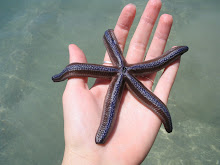As I have mentioned before, we get a lot of visitors to the station. Some are high-rolling tourists on fancy boats and others...... well, others come in sailboats. These people certainly get bravery points in my book. Crossing the Drake Passage in a small sailboat doesn't spell safety to me. And yet, many do it. I think they are a type of people that I had only seen or heard of from dusty books and hollywood. Adventure still exists in the world, and the other day, it came to us in the form of a family of six, from France.
It was just another lazy Sunday morning in the dining room lounge when the admin assistant came through the building with six bright, smiling faces in tow. A mom and a dad, three girls, and a little boy. They were giddy with excitement to be on land and touring a research facility. We all sat down to have lunch together and that's when I learned that they are nearly halfway through a four-year "trip" around the world. I say trip in quotes because I'm not even sure what to call it when a family lives at sea and in port towns for that long. Life hiatus? The ultimate tour de Force? Either way, not many people experience what they are doing.
Seeing the world via boat must be incredible, but think of the logistical challenges! They work things out by shipping themselves supplies and making friends everywhere they go. When they come into port, they have very few plans and stay as long as they like. The children have a wall of school books in their "room" and take turns cleaning the dishes each night. The eldest daughter, Josephine, is an aspiring diver at thirteen but told us that she is homesick for a more normal life. All of the children spoke beautiful English, were learning Spanish, and were especially excited when the cooks brought out our ice cream. After a few days tied up in our inlet, they said goodbye and sailed out in the direction of South Africa. It makes me wonder how many adventure-seekers are out on the water, climbing mountaintops, or traversing deserts around the world. Maybe we can all borrow a little bit of their spirit.
Speaking of visitors, the Gould's sister ship came by last week to drop off one of their science groups that was desperately in need of internet. In this group of five, one was a Grinnell grad '06 and the other a Scripps PhD student with whom I shared a class last semester! Their original plans were thwarted by impassable sea ice on the east side of the peninsula where the famous Larrson B ice shelf collapsed several years ago. They could still run their aerial projects and helicopter operations but it was decided that the ship wasn't tough enough to break through the ice. Safety first. So, they came all the way to Palmer for a day to research other possibilities. Science on the fly.
My favorite part of the story, though, is what the ship did after it dropped them off. The Palmer and crew sailed south to assist the LTER cruise because they had suffered a few unlucky breaks aboard the Gould. I don't know the details, but they hadn't been able to retrieve a few important pieces of science equipment and needed some muscle. I'm not sure why I find it so endearing, but it's very neat that they are willing and ready to communicate and coordinate in that way despite being chartered for completely separate agendas. It is a good reminder of how much effort goes into this work, and more importantly, that normal people are behind it all. The ship is just filled with equipment and each one is operated, maintained, and deployed by hard-working individuals. Just normal people making honest mistakes and heart-felt decisions. I bring this up because those truly human components of research are often overlooked in popular visions of the scientific process. There is a lot of glory in fieldwork and publishing journal articles, but there's a lot of grime and heartache that aren't in the manuscripts as well. And in life, I think perception is what matters most in the end.
Monday, January 18, 2010
Subscribe to:
Post Comments (Atom)







No comments:
Post a Comment